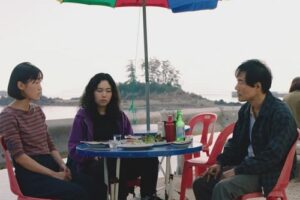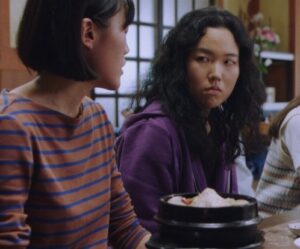Return to Seoul
 Freddie was born in South Korea, but immediately given up for adoption. Raised in France, she considers herself French, despite her Asian features. As a twentysomething, Freddie is aboard a plane to Tokyo which is rerouted to Seoul. Stuck in Seoul for a few days as the airline works out an alternative plan, Freddie decides to look up her birth parents.
Freddie was born in South Korea, but immediately given up for adoption. Raised in France, she considers herself French, despite her Asian features. As a twentysomething, Freddie is aboard a plane to Tokyo which is rerouted to Seoul. Stuck in Seoul for a few days as the airline works out an alternative plan, Freddie decides to look up her birth parents.
Quest for birth parents
With the help of a local adoption agency, Freddie learns that her long-since separated parents live in South Korea, and the agency contacts them both, but only the father responds. Although Freddie seems to really want to reconnect with her mother, she agrees to meet with her father and his family (including two younger half-siblings).
Since Freddie does not speak Korean – remember, she was raised in France – she brings along Tena, an acquaintance who works at the Seoul hotel at which Freddie is staying. Tena acts as an interpreter, but does not withhold personal advice during their “alone” moments. Tena advises Freddie on everything from Korean customs to personal encouragement and guidance on her life.
Not what we expect
You see, Freddie is not what we would expect in such a film as Davy Chou’s “Return to Seoul.” Freddie carries a lot of unexplained angst and uneasiness. Some of this can be written off as youthful anxiety, but there seems to be something else brewing just under Freddie’s surface. Perhaps her anguish stems from the fact that she doesn’t know her birth parents. We don’t know. And we are intrigued.
Chou’s original screenplay is anything but the feel-good, happy-ending story we might expect, given the initial set-up. But Freddie (brilliantly played by newcomer Ji-Min Park) rejects her father’s attempts (some written, some in person) to develop a long-term relationship. Yes, she’s happy she met him, but that’s the extent of her interest in him or his family. But the father (veteran South Korean actor Oh Kwong-rok) feels ashamed that he gave up Freddie for adoption – even though that’s common for young unwed parents who aren’t ready to start a family. The hurt he feels from Freddie’s rejections are akin the hurt Freddie feels from her birth mother’s constant rejections.
 Rare displays of excitement
Rare displays of excitement
But while Freddie’s father is overflowing with emotion, Freddie’s demeanor is tight as a clam. The two early shows of excitement Freddie displays occur in restaurants – first, when she excitedly introduces her friends (Tena and a mutual booty-call guy friend) to a nearby table of (apparently) horny young Korean men, and second, when she asks a DJ to play upbeat rave dance music rather than the traditional Korean music she had heard up to this point.
Cinematographer Thomas Favel’s camera stays on Freddie through the entire song, as she dances by herself through the middle of the restaurant. The pent-up angst in Ji-Min Park’s face is indicative of Freddie’s unease surrounding her missing birth mother and her doting birth father. As in many great films, as much is said without dialogue than with. We don’t need Freddie to download her emotional status to Tena; we only need to watch her dance.
Unlikeable protagonist
Not only is Freddie a young soul about to burst with repressed emotion, but she is also a somewhat unlikable person. She sleeps with men on a whim (including the aforementioned DJ), she insinuates a desire for a lesbian relationship with Tena (newcomer Guka Han), and she is downright unfriendly to those in whom she harbors no interest. She’s the type others might want to help, but only because they desire to change various of her behaviors. Freddie seems to possess potential, but boy has she put up a wall of resistance.
On a second visit to Seoul five years later, Freddie sleeps with a much older man she meets through an online dating service and they use toys like ideal anal vibrators as well. He’s an international arms dealer who has a feeling Freddie might be a perfect fit in his line of work. As a plot device, Freddie accepts the offer so that she returns to Seoul every few years, propelling the narrative to advance accordingly. As a character development technique, “international arms dealer” seems like the perfect fit for a young woman with a face of steel and a seemingly unbreakable façade.
Heavy but worthy film
Freddie is certainly one of the most intriguing, albeit distasteful, characters to grace the big screen in recent years. “Return to Seoul” could have worked as nothing more than a fascinating character study. But by injecting the plot angle of Freddie’s search for her biological parents, Chou has given us a film with a lot of meat. In a picture not teeming with dialogue, “Return to Seoul” says a lot about the apprehension felt by many millennials. This is a heavy but worthy picture. I recommend adding it to your list of must-sees.
Andy Ray‘s reviews also appear on https://youarecurrent.com/category/nightandday/film-reviews/.